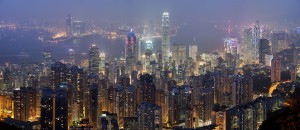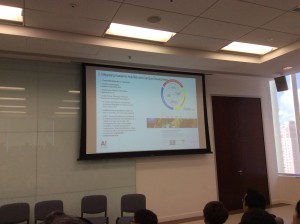
July 15, 2015, by sustainablenottingham
International Sustainable Campus Network Conference 2015
The International Sustainable Campus Network (ISCN) recently held it’s 9th annual conference at The University of Hong Kong. The theme of the conference was “Expanding the Dialogue: Sustainability in a Connected World”. The conference brought together experts and practitioners from across the globe for cross-cutting communication and connection between higher education, business, government and civil society.
Andy Nolan, Director of Sustainability, attended the conference, representing the University of Nottingham, the world’s number one ranking Green University in the UI Green Index.
But how does the ISCN relate to the University of Nottingham and its Sustainability Strategy?
Andy has summarised each day’s presentations and forum discussions and how the ideas and issues raised relate to our university and how we can learn from other’s examples.
Day 1:
This afternoon at the ISCN conference in Hong Kong there is a focus on the way in which universities and cities can form effective, collaborative alliances to contribute towards meeting the challenge of urban living in the 21st Century. It’s a response to the World Economic Forum Global Risks 2015 report which flags up climate change, urbanisation and growing population and aspirations within them.
Without doubt urbanisation is the perfect platform to encourage inter-disciplinary collaboration within universities. Those UK universities who have identified this as an opportunity to promote this through an emphasis on urbanisation are creating think tanks, centres of excellence and institutes to address them.
K.S.Wong, the Secretary for Environment, Hong Kong, spoke at the conference as a graduate of Hong Kong University and has led the policy development of green building standards building on his training as an architect.
Despite the obvious urbanisation of Hong Kong, the island remains green, but liveability and its eco footprint is central to its planning. Policies around green spaces, sprawl, natural assets, connectivity and isolation are in place to preserve these attributes. By maintaining high levels of density it is clearly possible to protect natural assets but also achieve impressive performance in energy intensity.
To that end, HK is:
- developing a green neighbourhood on the site of the former city airport and using a district cooling system
- committing all public buildings to meet green building standards
- developing a waste to energy plant from sewage sludge to power the islands needs
- developing an exemplar zero carbon building
The climate in Hong Kong presents a significant challenge with high temperatures and humidity driving demand for cooling and dehumidification systems to maintain comfort in buildings. Sharing the knowledge and learning from Hong Kong with the developing world is central to its mission.
Again, air quality remains a high priority and by law low sulphur fuels will be required to address this problem. Shipping remains an important contributor to poor air quality in Hong Kong.
Air, waste and energy are central to its strategy, with a strategy of tackling the causes at source and, encouragingly, the focus isn’t just on the hardware but also on the software – working to promote behaviour change through social marketing.
There is a clear expectation from KS Wong that the University of Hong Kong has the opportunity to out perform the HK average in terms of waste, energy and air quality. The Air Quality Health Index is the first in Asia to adopt this approach to share health data to those vulnerable to air pollutant. Similar schemes exist in the UK.
Following the keynote from KS Wong it was great to hear from Mayor Park Won Soon from Seouol via video. As a renowned proponent of sustainability and has committed to its principles in the development of Seoul. He explicitly made the point that cities and universities must work together to achieve their collective goals both in terms of infrastructure and the development of its communities. Seoul has worked with many universities in South Korea to further these aims.
Fostering synergies between universities and cities is key to addressing climate change, urbanisation, water stress and working together to identify solutions for cities. Seoul recognises energy is a key issue and is taking a strategic approach to reduce dependency on nuclear through moves to reduce demand for electricity through efficiency drive and localised renewable investment. This has also created a surge in the growth for more sustainable energy services such as LED lighting creating wealth and employment. In Seoul, universities and hospitals are amongst the most energy intensive buildings in South Korea. The Government has invested in the universities themselves with a $40m to demonstrate leadership and to drive down consumption.
Throughout his address there was continued emphasis on the opportunity to stimulate and engage young people with innovative approaches to tackling urban challenges with an emphasis on civic responsibility. Again, financial incentives from the government have catalysed this engagement.
Civic engagement has been supported through a series of Town Hall meetings – inviting opinion and input to macro issues like energy. An association for 35 universities have combined to promote and develop green campuses. An energy cooperative has been formed to provide finance and reinvestment in renewable energy generation projects across Seoul.
Following those two plenary speeches a panel of experts presented and discussed the role of universities and cities in the 21st century.
Healthy high density cities is becoming an increasingly important factor for fast growing cities and a new research centre has been formed at HKU to address this very specific challenge between engineering and architecture and health professionals.
Aalto University is consolidating after the merger of 5 universities giving the opportunity to create an integrated campus/science park to work closer with business and industry. The design of the new campus is designed to positively encourage collaboration to support the strategic aim of integrated academic activities.
The University aims at energy self-sufficiency by 2030 through energy generation on site and changing consumer behaviour. They are developing the most powerful geothermal system in the world with a 7km geothermal well to produce 10% of the city’s energy needs.
Sandy Burgoyne, Director Future Cities Collaborative, from The University of Sydney, spoke about how the research underway to inspire city leaders to develop sustainable cities. Policy, practice and people are at the heart of the programme and engage Mayors in developing their own understanding of sustainability. The model builds on the Mayors Institute in the USA and encourages Mayors to bring challenges forward and to work collaboratively with universities to solve these challenges. The programme is working at city scale – eg Paramatta and looking to identify solutions that are right for that city.
The universities involved in these kind of programmes can bring thought leadership, collaboration across government, industry, commerce and academia to show what is possible. The model works well for ‘real time’ responses to challenges at scale.
The Chief Excecutive of MTR Corporation in Hong Kong, Lincoln Leong, gave an overview of the way in which the MTR system in HK has transformed the island. In an impressive and enthusiastic presentation he showed how Metro systems play an important role in urbanisation across the world.
In HK there are 221km of track, 5.4m passengers and provides almost half of all public transport journeys.
As a result of success in HK over the past 40 years they are now expanding into Australia, mainland China and Sweden. By providing this infrastructure can transform cities, connecting communities and creating opportunities to enhance communities – retail, business and industry.
The 3km extension of the network to the west of HK at the end of 2014 connected Hong Kong University into the whole island enabling greater access from east to west. Significant investment in lifts and escalators to service stations gave additional benefits to all communities to assist movement around the hilly terrain of the island.
Further expansion of the MTR is planned in HK to provide greater connectivity.
Edward Ng, Chinese University of Hong Kong, espoused the virtues of the intellectual contribution of the university to policy development in Hong Kong. As an example, the assessment of urban heat islands has helped shape thinking on energy and urban planning.
The opportunity to deliver sustainable energy solutions and reduce demand through improved behaviours. By installing values of sustainability into university education and encouraging sustainable values such that ‘convenience’ is recognised as costly.
Each speaker throughout their short sessions and in the discussion session supported the concept of universities and cities working much more effectively together at all scales – at the city scale, at the district/campus scale, at the organisational scale and with individuals and their communities.
So why doesn’t it happen more often? I suspect it is largely because the one to one relationships between leaders of both cities and universities haven’t invested enough in building an effective relationship on which to build this approach.
It’s good then that universities and cities are beginning to rebuild those relationships. Let’s not pretend it’s altruistic and philanthropic. Much of it in the UK, at least, is borne out of a restructured public sector that no longer has the intellectual capacity to develop and design policy in an era of ever increasing complexity and risk. Evidence, data and informed policy will maintain sustainable urban living.
No comments yet, fill out a comment to be the first



Leave a Reply